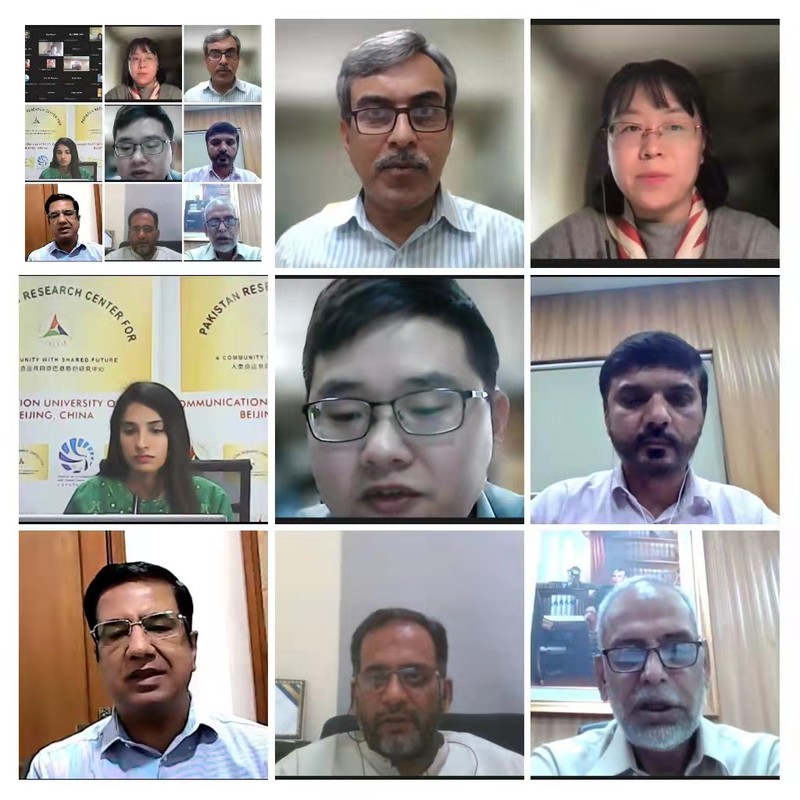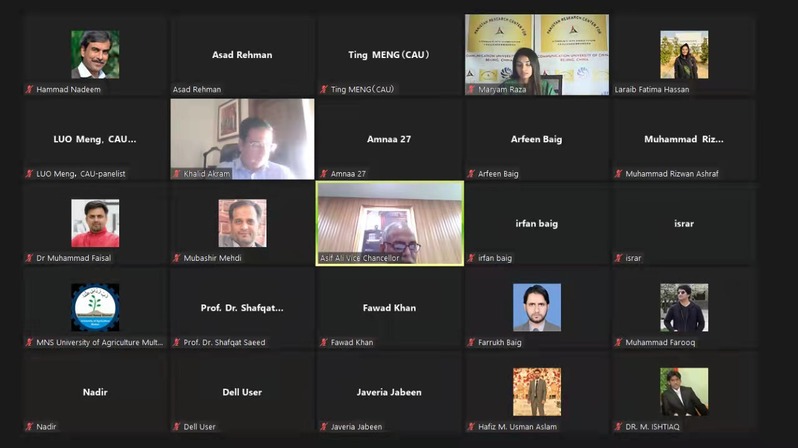
Online International Conference on “Agriculture Advancement and Sustainable Development: Learning from Robust Chinese Initiatives” jointly organized by Pakistan Research Center for a Community with Shared Future and MNS University of Agriculture, Multan |
21st April 2022

On 21st April 2022, an Online International Conference on “Agriculture Advancement and Sustainable Development: Learning from Robust Chinese Initiatives” was held. The conference was jointly organized by Pakistan Research Center for a Community with Shared Future and MNS University of Agriculture, Multan.
The aim of the online conference was to discuss China’s agricultural development and its sustainability by focusing on agriculture-environmental nexus. The conference also integrated leading agricultural stakeholders, scientists and researchers from China and Pakistan to provide suggestions to enhance Pakistan’s agriculture sustainability under the grand concept of Community with a shared future.
The conference commenced with the opening remarks by Mr. Khalid Taimur Akram, Executive Director, Pakistan Research Center for a Community with Shared Future. He briefly explained the aim of the Pakistan Research Center for a Community with Shared Future and its achievements. He stated that this center has developed in Pakistan on the vision of President Xi Jinping of the community with shared future. He explained that today’s event will lay a solid foundation for joint collaborative network between the agriculture sectors of Pakistan and China. He stated that such conferences will bridge the gap between the universities and agriculture researchers in both countries.
Prof. Dr. Irfan Ahmad Baig, Dean Faculty of Social Sciences, MNS University of Agriculture, Multan shared his analysis on Food Security and Climate Change under the Concept of Community with Shared Future. Hediscussed global challenges and stated that the top ranked challenge for the world in this era is food for all. He stated that the agriculture is linking the communities across the globe. Enhanced trade and movement of food from one part to the other, shortage of grain eventually affects the other part as well. Dr. Irfan also shared the guiding principles of communities with shared future and explained about rethinking our relationship with nature mutual respect, and develop indigenous solutions. While concluding, he mentioned the 3Es strategy for a win-win cooperation through local partnership and co-designing strategy for broader collaborations.
Professor, Dr. Ting Meng, Lecturer, Department of Agricultural Economics, School of Economics and Management, China Agricultural University given presentation on Latest Trends in China’s Agriculture Production towards sustainability: Policies and actions. She explained that 17 SDGs are connected to agriculture and environment so it is crucial for world’s sustainability. She also shared latest trends in the agricultural policy of China. She mentioned that China had four ways of doing this. She explained that China has initiated the formula fertilization by soil testing and this policy has been Adapted and application has been reached almost 890 % she added. While concluding her presentation, she discussed valuable experiences of sustainable agricultural development and stated that China has entered into a phase of development for reducing pollution and recycling. The pilot works, identification of best practices and formulation of policies must be kept reviving. Prof. Ting also expressed her interest in learning agricultural developmental methods from Pakistan and other countries as well.
Dr. Mubashir Mehdi, Associate Professor & Director, Business Incubation Center, MNS University of Agriculture, Multan shared his expert opinion on Food Security Challenges in Pakistan: Reforming Government’s Role in Agriculture. He talked about the three fundamentals of food security and food supply chain. He mentioned the current state of food security in Pakistan in terms of availability and affordability and stated that Pakistan is self-sufficient in major staples like in wheat, rice, sugarcane and milk. Despite that only 63.1 % of the country’s households are food secure.If we compare the provinces of Pakistan, we can see that Gilgit is less severe food security. He also discussed about the food chain management challenges which include the vertical coordinated value chains have far reaching implications and industrialized production processes have higher consumption of processed foods, lower food values have larger ecological footprint. Dr. Mehdi suggested that government should start working on structural reforms, then the economic and climate reforms for promotion of green economy, which is very important. He stated that we need to improve small to medium cottage industries in rural area in order to promote the agricultural promotion.
Dr. Muhammad Hammad Nadeem Tahir, Professor and Director, Institute of Plant Breeding and Biotechnology, MNS University of Agriculture, Multan discussed the topic Promoting Technological Transformation in Pakistan’s Agriculture Sector. He stated that CPEC is not only the development of different infrastructures but it also provides the opportunity for technological transfers for the mutual benefit of both countries. He explained China’s agricultural imports and provide wat forward via technological assistance. He explained that under the CPEC project, industrial parks can help fix agricultural problems and increase efficiency. He also talked about the Irrigation problem as water resources depletion. He stated that different MOUs have been signed with Chinese institutions for getting the technologies and improving the cropping system.
Mr. Luo Meng, Ph.D. Candidate, majoring in Agricultural Economics and Management, College of Economics and Management, China Agricultural University explained Eco-smart Agriculture: China's Current situation and Development Vision. He talked about the current situation of China’s agriculture and explained some of the statistics of China’s agricultural production. He stated that the new smart technologies are the turning points in China’s agricultural sustainable development which can be achieved by improving scientific and technological revolution and eco-smart agriculture. He explained about a case of eco-smart agriculture in China and the unmanned farm of Shandong. He explained audience, the idea is building the ecological farm system and application of ecological farming mode. He also discussed about the application of ecological fertile soil mechanized farming and discussed the digital agricultural model in Chengdu. While concluding, Mr. Luo highlighted the 14th five-year plan for green development of agriculture in China and also discussed the development of science and technology in agriculture and rural area. He stated that the national agricultural development plan will accelerate the spread of green intelligent agricultural machinery and equipment. It will be cost saving and high efficiency agricultural mechanism in China.
Prof. Dr. Asif Ali, MNS University of Agriculture, Multan was the Chief Guest in the online international conference. He appreciated the efforts of PRCCSF team and the Chinese Counterparts for wonderful contribution to this topic. He stated that such events are important for mutual learning, expertise sharing, and cooperation. Dr. Asif also appreciated the speeches made by all the speakers and shared his profound analysis on the subject. He extended his support to work with PRCCSF and Chinese institutions in future. He stated that the concept given by president Xi Jinping for a shared future is great and so we must focus on building communities to enhance research.

The international conference was moderated by Ms. Maryam Raza, Deputy Director, Pakistan Research Center for a Community with Shared Future. The conference was viewed live on various social media platforms and was attended by 50 participants, including students and leading experts from Pakistan and China.
Reported by PRCCSF.
